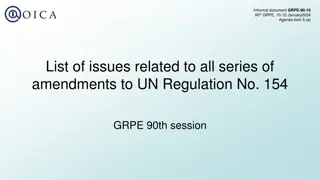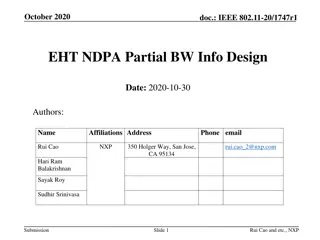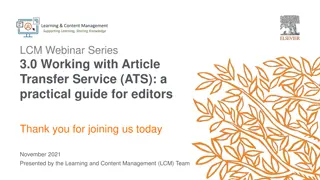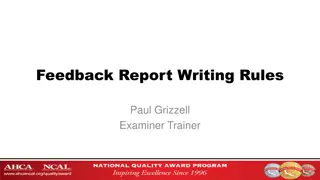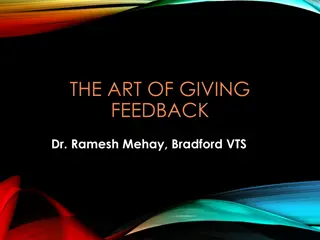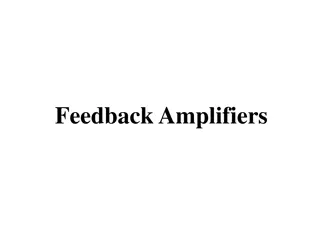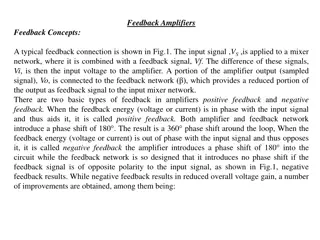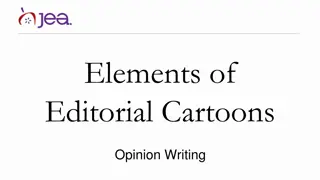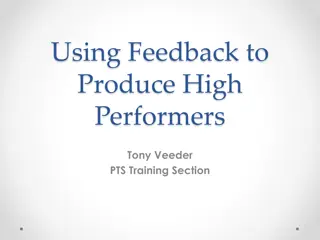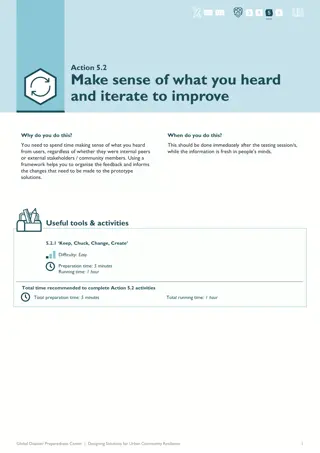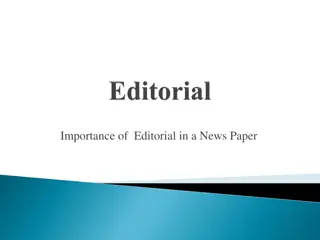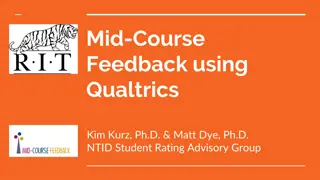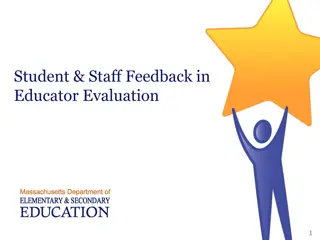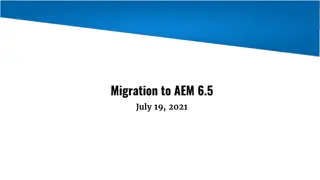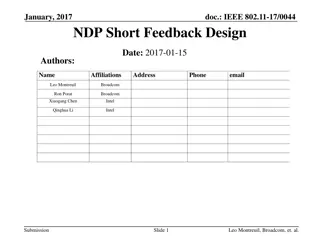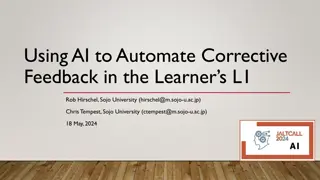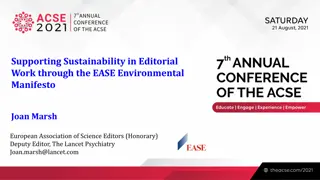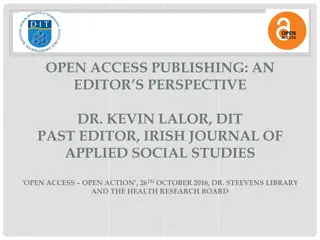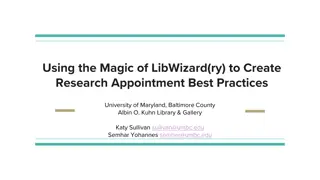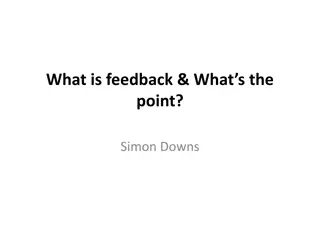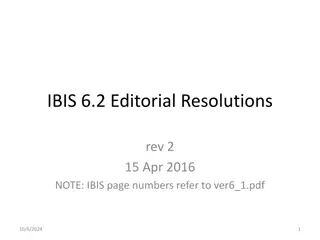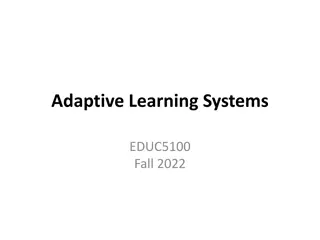Enhancing Student Learning Through Effective Feedback Strategies
Effective feedback plays a crucial role in improving student learning outcomes by providing specific information that students can use to enhance their performance. This content explores the importance of feedback, examples of good feedback practices, qualities of good feedback, and what components
5 views • 16 slides
Issues Related to Amendments to UN Regulation No. 154 at GRPE 90th Session
Explore a list of editorial topics raised in the context of series 00, 01, 02, and 03 amendments to UN Regulation No. 154 being discussed at the GRPE 90th session. The topics cover editorial errors in tables, missing information, and references that need correction for a clearer regulatory framework
0 views • 20 slides
Effective Strategies for Providing Timely Feedback in Academic Settings
Explore key features of feedback, including goal-oriented focus, specificity, user-friendliness, timeliness, and consistency. Learn about factors influencing the acceptance and delivery of feedback, along with stages of change in implementing timely feedback practices for students in educational env
1 views • 33 slides
Design Considerations for Partial Bandwidth Information in IEEE 802.11-20/1747r1
Design considerations for partial bandwidth information in the IEEE 802.11-20/1747r1 standard are discussed, focusing on EHT NDPA frame structure, feedback mechanisms, bitmap design, and table-based designs to support large RU/MRUs. The feedback mechanism utilizes bitmap resolution signals, providin
1 views • 10 slides
Practical Guide for Editors: Working with Article Transfer Service (ATS)
A comprehensive webinar series exploring the intricacies of Article Transfer Service (ATS) within Elsevier, highlighting its importance, benefits, workflows, and connections in Editorial Manager. Editors learn how ATS streamlines manuscript transfers between journals, benefiting both authors and edi
0 views • 14 slides
Effective Feedback Strategies for Learning Enhancement
Feedback plays a crucial role in the learning process. This session focuses on strategies for providing effective feedback to improve learning outcomes, course, and assignment design, best practices, and tools for efficient feedback delivery. Understanding the importance of prompt feedback and diffe
3 views • 20 slides
Mastering Feedback Report Writing: Rules and Guidelines for Effective Communication
Dive into the essentials of feedback report writing with a focus on Strengths and Opportunities for Improvement (OFI) comments. Learn the purpose, conventions, and best practices for crafting impactful feedback that helps organizations strive towards higher performance and efficiency. Understand the
2 views • 18 slides
Mastering the Art of Giving Feedback
Learn the importance of feedback, how to provide it effectively, and why it is crucial for personal and professional development. Explore the positive impact feedback can have on performance, motivation, self-awareness, and insights. Discover practical tips on giving constructive criticism and creat
1 views • 39 slides
Understanding Feedback Amplifiers: Structure, Properties, and Topologies
Electronic circuits rely heavily on feedback mechanisms, particularly negative feedback, for various purposes such as desensitizing gain, reducing distortion, controlling impedance, and improving amplifier bandwidth. This article explores the general structure of feedback, properties of negative fee
0 views • 68 slides
Enhancing Feedback Practices with Audio-Visual Technology: A Study on Student Satisfaction and Attainment
This presentation delves into the implementation of Audio-Visual Feedback (AVF) technology to improve assessment feedback practices in an educational institution. The study explores the impact of AVF on student satisfaction levels compared to traditional written feedback, as well as its influence on
0 views • 21 slides
Understanding the Importance of Feedback in Achievement Enhancement
Feedback plays a crucial role in encouraging or discouraging behavior, making it essential to provide constructive feedback that focuses on growth and improvement. Improper feedback can lead to incompetence in the workplace. Learn about the definition of feedback, how to give feedback effectively, a
2 views • 22 slides
Understanding Feedback Amplifiers in Electronic Circuits
Feedback amplifiers play a crucial role in electronic circuits by providing mechanisms for controlling gain, stability, and overall performance. There are two basic types of feedback - positive and negative, each offering distinct advantages. The four ways of connecting feedback signals involve volt
1 views • 18 slides
Exploring the Elements of Editorial Cartoons in Opinion Writing
Discover the significance of editorial cartoons in conveying opinions through visual storytelling. Uncover why editorial cartoons are effective, whether they need to be humorous, and the key elements such as analogy, irony, symbolism, and labels. Dive into examples illustrating how these elements ar
0 views • 9 slides
Enhancing Feedback Strategies in ELA Learning Project Day
Refine understanding of ELA, engage with student exemplars, and design constructive feedback in a structured agenda. Activities include generating feedback, digging deeper into feedback processes, and considering the impact of timely and specific feedback on student growth in learning and skills. Co
0 views • 31 slides
Effective Feedback Strategies for Resident Teachers
Effective feedback is critical for the growth of resident teachers. This guide covers types of feedback, why it's important, what makes feedback effective, behaviorally anchored rating scales, models for giving feedback, and key tips for delivering feedback successfully.
0 views • 14 slides
Effective Feedback Strategies for High Performance
Feedback plays a crucial role in helping individuals improve performance and reach their full potential. From providing helpful feedback to reinforcing desired behaviors, this guide explores various strategies, including redirection, reinforcement, and F.A.S.T. feedback, to enhance workplace perform
0 views • 21 slides
2010 Western Magazine Awards: Recognizing Excellence in Western Canadian Editorial Work
The 2010 Western Magazine Awards Foundation honored outstanding contributions in writing, design, and photography, with Timothy Taylor winning the Gold Award for Best Article in the B.C./Yukon region. Vancouver Review emerged as a key player in the literary and arts scene, showcasing a critical pers
1 views • 29 slides
NSU Editorial Style Quick Tips and Guidelines
Learn valuable NSU editorial style quick tips on punctuation, capitalization, grammar, numbers, and more to enhance the clarity and professionalism of your writing. Get insights on when to use the serial/Oxford comma, em dashes, and proper capitalization rules. Understand the correct usage of facult
0 views • 7 slides
Enhancing Postgraduate Academic Writing: Feedback Collaboration Model
Developing a collaborative model for postgraduate academic writing courses involves understanding the role of feedback, focusing on content feedback, and exploring the intersections between discipline specialist and writing tutor feedback to improve academic writing abilities. Feedback offers valuab
1 views • 27 slides
Insights into the Editorial Process of Applied Thermal Engineering Journal
Applied Thermal Engineering journal, under the leadership of Editor-in-Chief Prof. David Reay, has a rich history dating back to 1981. The journal's evolution, from its origins as Heat Recovery Systems to its current name and scope, reflects its commitment to advancing thermal engineering knowledge.
0 views • 29 slides
Iterative Feedback Framework for Prototype Improvement
The iterative feedback framework involves making sense of user feedback using the Keep, Chuck, Change, Create (KCCC) model to iterate and enhance prototype solutions. This process helps organize input from testing sessions, informing necessary modifications for better outcomes. The framework emphasi
1 views • 26 slides
The Significance of Editorial in Newspapers
The editorial page in a newspaper serves as a platform for expressing opinions that reflect the publication's stance on various issues. It plays a crucial role in providing analysis, interpretation, and guidance to readers, encouraging them to consider perspectives that prioritize the public good ov
0 views • 32 slides
Exploring Editorial Cartoons and Opinion Writing
Editorial cartoons and opinion writing are powerful mediums used to express opinions on various topics. Editorial cartoons convey opinions through visual imagery and minimal text, while opinion writing presents the author's stance on timely issues. When crafting an opinion piece, it is essential to
0 views • 7 slides
Understanding Mid-Course Feedback Using Qualtrics
Mid-Course Feedback (MCF) is a valuable process that allows students to provide feedback on their courses mid-semester, impacting teaching strategies, communication, materials, and more. This feedback benefits both students and instructors by improving teaching effectiveness, student satisfaction, a
0 views • 21 slides
Importance of Student and Staff Feedback in Educator Evaluation
Student and staff feedback plays a crucial role in educator evaluation, providing valuable insights into areas of strength and growth. Informed by evidence such as surveys, observations, and artifacts, feedback helps educators tailor their practice, fostering two-way communication and professional d
0 views • 14 slides
AEM 6.5 Migration Initiative Overview
This initiative aims to resolve the compaction issue in AEM 6.5, reduce system locking time, and provide uninterrupted access to editorial teams. The primary goal is to eliminate compaction time and upgrade to the latest AEM version to benefit from security patches and new features. Main stakeholder
0 views • 19 slides
Understanding Cascade Control Systems in Industrial Processes
Cascade control systems play a crucial role in improving process control efficiency by incorporating feedback loops within feedback loops. This type of control architecture helps to better handle disturbances and variations in the process by creating secondary loops that monitor specific parameters.
0 views • 8 slides
IEEE 802.11-17/0044 NDP Short Feedback Design
The document discusses the need for short simultaneous feedback from multiple STAs in IEEE 802.11 systems for improved efficiency. It introduces the NDP feedback mechanism and proposes a signaling technique to efficiently collect feedback from a high number of STAs. The mechanism involves UL MU tran
0 views • 19 slides
GEBCO Technical Sub-Commission on Ocean Mapping (TSCOM) Overview
Technical Sub-Commission on Ocean Mapping (TSCOM) is a key component of the GEBCO program, established in 2006 to provide expertise in seafloor mapping and discuss emerging technologies. TSCOM serves as an authoritative source for bathymetric and hydrographic data and offers ongoing advice to associ
0 views • 12 slides
AI Automation for Corrective Feedback in Language Learning
Exploring the utilization of AI technology to automate and enhance corrective feedback in language learning, addressing challenges such as time constraints, delayed feedback, and student comprehension. Introduction of a new AI text tool by Marcus Green for accessible and effective feedback provision
0 views • 13 slides
Supporting Sustainability in Editorial Work: EASE Environmental Manifesto
Environmental sustainability in scientific publishing is highlighted through the EASE Environmental Manifesto, aiming to reduce the environmental impact of editorial activities. This manifesto encourages policies, digital transition, eco-friendly print distribution, and office management practices t
0 views • 10 slides
Challenges and Support in Open Access Publishing: An Editor's Insight
Reflecting on the evolution of open access publishing from its low-cost origins in 1998 to the digital era, this editorial explores challenges like marketing and impact factors, while emphasizing the crucial role of support from libraries, Editorial Boards, and managing editors in sustaining small,
0 views • 8 slides
Enhancing Research Appointment Services at UMBC Library
UMBC subject librarians implemented a feedback survey to improve research appointment services. By analyzing feedback data, shared best practices were developed to ensure quality and consistency. The project timeline included identifying goals, drafting the timeline, creating the feedback form, and
0 views • 7 slides
Understanding the Importance of Feedback in Learning and Development
Feedback plays a crucial role in providing information about performance or behavior to affirm strengths and improve weaknesses. It helps individuals become consciously competent by identifying areas for improvement through formative assessment. Effective feedback enhances motivation, promotes learn
0 views • 33 slides
IEEE 802.11-19/0709r0 - Immediate and Delayed Feedback May 2019
The document discusses immediate and delayed feedback mechanisms in IEEE 802.11-19/0709r0, focusing on parameters, feedback types, and ranging options. It explores variations in feedback direction and types, proposing options for phase shift feedback and distinguishing between RSTA-to-ISTA and ISTA-
0 views • 6 slides
Understanding Changes in IBIS 6.2 Editorial Resolutions
Explore key updates in the IBIS 6.2 Editorial Resolutions, including new definitions, GND usage clarification, DUT vs. DIA descriptions, and model name guidelines. Learn about the distinctions between Device Under Test (DUT) and Device In Action (DIA) in IBIS files. Discover how IBIS files describe
0 views • 21 slides
Product Feedback Forum at NWS: Provisional PS-PVR User Feedback on ABI, CMI, and L1b
A comprehensive feedback system managed by PRO at NWS, focusing on user input for GOES-R products such as ABI, CMI, and L1b. The forum gathers feedback through surveys and weekly calls, addressing product quality issues and ensuring effective communication with field sites. Noteworthy discussions in
0 views • 18 slides
Understanding Feedback in Learning Systems
Exploring the role of feedback in educational settings, this content delves into the concept of providing information to learners by various agents. It discusses the importance of feedback in guiding learning progress, highlighting examples of correctness feedback and correct answer feedback. The be
0 views • 66 slides
Feedback and Mentoring Workshop for HIV Researchers
Mentoring workshop for HIV researchers focusing on giving and receiving feedback, nurturing early career investigators, and working with faculty continuum. The workshop offers insights on feedback exercises, assumptions, and rhetorical questions about feedback. Participants are encouraged to reflect
0 views • 33 slides
Ricardo Gon.alo - HSG5 Editorial Board Meeting Summary
The content includes discussions and comments from the HSG5 Editorial Board Meeting with Ricardo Gon.alo on 7th July 2011, covering topics such as analysis justifications, jet cuts, W/Z cross-section papers, reconstruction efficiency, and trigger thresholds for electrons in WH and ZH analyses.
0 views • 6 slides

